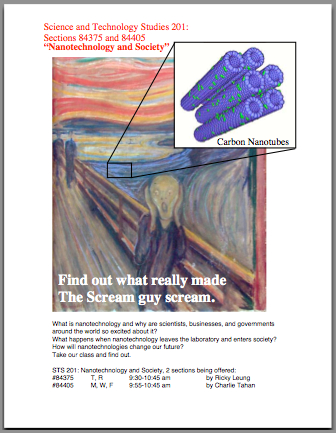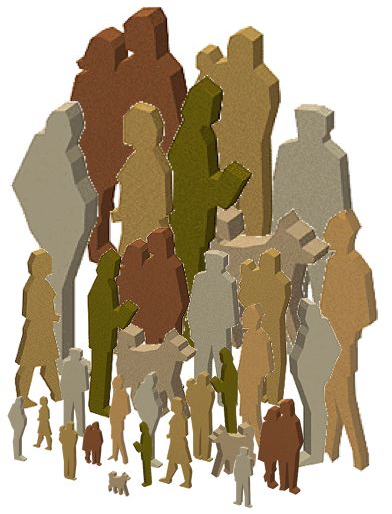 About the course
About the course
This course introduces the emerging and ill-defined field of nanotechnology to a diverse, nontechnical audience and explores nanotechnology's economic, historical, societal, political, and evironmental implications and origins. There are roughly 25 undergraduates in the class from freshman to seniors(+) representing a wide array of majors from the engineering sciences to business to humanities. (See the pre-assessment for more information on the class makeup.) This is not a mathematical or technical class. In fact, we'll spend most of our time on the humanities side of the world, but you will learn a lot of nanoscience. You will be introduced to a very broad array of cutting-edge technologies and ideas quite early on in your careers. For more information, refer to the syllabus.
This is an all new course offered for the first time this semester at the University of Wisconsin. There are two sections of the course being offered: this one by me, CT, a physics graduate student and another one by Ricky Leung, a sociology graduate student. I can take absolutely no credit for the existence of the course or its inception. That goes to a group of people at the university including Clark Miller (Public Policy), Wendy Crone (Engineering Physics), Karin Ellison (History of Science), Greta Zenner (MRSEC), and several others in the Wisconsin Initiative on Nanotechnology and Society who had the vision and the gumption to put together a NSF proposal - NUE: An Integrated Approach to Teaching Nanotechnology and Society - and develop a graduate seminar prepatory course for last fall (2004). In that course we went through some of the key articles in technology and society and each grad student developed a syllabus for the undergraduate course this semester, in addition to getting a chance to try out active teaching and learning techniques. It is no secret that my reading list borrows heavily from this prepatory course. Coming from a materials science/physics background, the contributions from the humanites and public policy professors was invaluable.
This is primarily a discussion-based course built around selected readings, course topics, and various worksheets, activities, assignments, etc. As such, much of the details of the individual classes are explored freeform in the classroom and are not available online. Obviously, the instructor plays a large role in shaping and guiding the discussion and in making the course what it is or what it will be. However, the skeleton of the course - the readings, worksheets, exams, assignments, resources - are all provided here.
This is hopefully a question we will answer as we go through the class. From a practical stance, nanotechnology is widely considered to be "the next big thing" and is well worth learning more about, if only to be able to understand - and perhaps debunk - the massive media attention it's been starting to elicit. What is nanotechnology? Is it all hype? Is it dangerous? On another level, nanotech provides a new angle to think about some of the timeless issues at the intersection of technology and society. Is technology good? What is progress? How much risk are we willing to take? How does politics and society drive technology and vice versa? These are profoundly important questions. I imagine all of you as future congressman or senators who must make educated and optimal decisions on the future of technological investment and on our country. By the end of this class I intend that you will be more educated on matters relating to nanotech and society than the people making the decisions in Washington today.
I am in my last year as a physics graduate student here at the University of Wisconsin-Madison. My field is condensed matter (or solid state) theory and my primary research interests have focused on quantum computing and spintronics in silicon and other semiconductor nanoscale architectures. I work a lot with experimentalists, electrical engineers, and materials scientists, as well as theorists, in the quantum computing group here. When the opportunity came up to teach a class on nanotechnology and society, I took it. I think we'll learn a lot and have fun along the way. This is all a very cool idea.
If you have any questions or suggestions, please contact me.

